Professional and corporate ethics
All employees should act ethically both at work and in their private life.
Members of professional bodies, such as qualified accountants, often have codes of ethics to guide them when ethical dilemmas arise. Several codes of ethics have been developed which are broadly similar.
'Profession' versus 'professionalism'
Profession
A profession is distinguished by certain essential and defining characteristics:
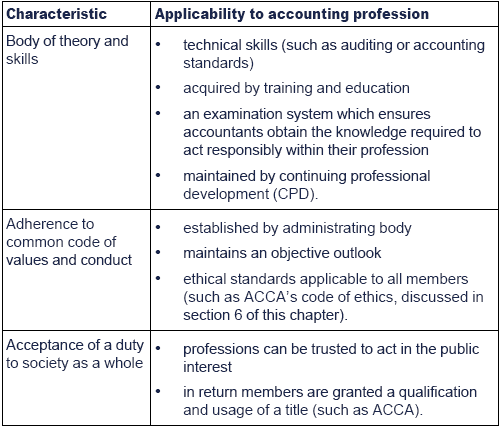
Professionalism
Members are seen to be acting professionally, or literally having professionalism.
- Professionalism may also be interpreted more as a state of mind, while the profession provides the rules that members of that profession must follow.
- Professional behaviour imposes an obligation on members to comply with relevant laws and regulations and avoid any action that may bring discredit to the profession.
- Professional behaviour will mean complying with the ethical standards laid down by the professional body.
The accounting profession
Over time, the profession appears to be taking more of a proactive, than a reactive, approach.
A reactive approach
Taking responsibility for any negative consequences of accounting practice and, where appropriate, amending those practices to remove those consequences.
Illustration
- Accounting practice failed to identify the risk that the Special Purpose Entities established by Enron to 'hide' its debts may not actually incorporated into Enron's main accounts.
- This may have attributed to the eventual downfall of Enron and the loss of pensions due to many Enron staff.
- The practice was removed by the requirement from the accounting profession to include this off balance sheet financing in the main accounts of companies.
- In this sense the accounting profession was reacting to a situation.
A proactive approach
Seeking out and positively contributing to the public interest.
Illustration
- The accounting profession recognises that guidance on how to carry out an environmental audit, or to accumulate appropriate metrics to include within an environmental audit, is not available.
- Guidance is provided 'in the public interest' as a benefit to society, rather than waiting until society as a whole requests the guidance.
The public interest
The distinguishing mark of a profession is the acceptance of a responsibility to the public.
- The accountancy profession's public includes:
- clients
- credit providers
- governments
- employees
- employers
- investors.
What is 'the public interest' ?
The public interest can be defined as that which supports the good of society as a whole (as opposed to what serves the interests of individual members of society or of specific sectional interest groups).
- For an accountant, acting in the public interest is acting for the collective well-being of the community of people and institutions that it serves.
There is much debate over a definition of the term 'public interest'. However, the public interest is normally seen to refer to the 'common well-being' or 'general welfare.'
An action is usually thought to be in the public interest where it benefits society in some way. It is unclear though how many members of society must benefit before the action can be declared to be in the public interest. Some people would argue an action has to benefit every single member of society in order to be truly in the public interest. At the other extreme, any action can be in the public interest as long as it benefits some of the population and harms none.
There is a potential clash between the public interest and the interests of society as a whole. In other words, what is good for society may not necessarily be good for individuals, and visa versa.
Public interest versus human rights
Acting in the public interest may seriously affect the idea of human rights, i.e. the degree to which members of society are allowed to act on their own. One view is that individuals should be free to act, as long as those actions do not harm other individuals.
The public interest and human rights will clash where:
- the action of an individual adversely harms other members of society, and
- actions of the state adversely affect some or all members of society.
For example, the action of an individual in injuring another member of society clearly affects the rights of the injured person. The state may legislate against injury, and remove rights from individuals involved in injuring others, i.e. imprison them. While this may be against the human rights of the person carrying out the injury, the overall public interest is served because society is a safer place.
Public interest and companies
The concept of public interest may affect the working of an organisation in a number of ways:
- The actions of a majority of the shareholders may adversely affect the minority shareholders. Protection of minority rights, in the public interest, may be required where the minority are denied certain rights such as access to dividends or decision-making processes.
- The actions of the organisation itself may be harmful to society, e.g. from excessive pollution or poor treatment of the labour force. The government may then decide, in the public interest, to limit the actions of that organisation for the greater good of society as a whole.
Public interest and legal cases
In law, public interest is a defence to certain lawsuits (e.g. some libel actions in the UK) and an exemption from certain laws or regulations (e.g. freedom of information laws in the UK).
Accountants and the public interest
Accountants do not generally act against the public interest.
- The ethical code applicable to most accountants confirms that such action is not normally appropriate.
An area of particular relevance to accountants will be that of disclosure of information:
- The concept of acting in the public interest tends to apply to providing information that society as a whole should be aware of.
- In many cases 'public interest' disclosure is used to establish that disclosure is needed although there is no law to confirm this action.
- This can affect companies where they are acting against the public interest as disclosure may well be expected.
Disclose or not ?
The accountant will need to evaluate each situation on its merits and then justify the outcome taken:
- In some situations lack of disclosure may be against the public interest.
- In other situations, disclosing information may be against the public interest, and such information should be kept confidential to avoid harm to society.
Accountants' roles and "influence"
Influence on organisations
The influence of the accountancy profession on organisations is potentially very significant.
- This is largely due to the range of services that accountants can provide, including:
- financial accounting
- audit
- management accounting
- taxation advice
- consultancy.
Limitations on influence
The influence of accountants is limited regarding ethical and other areas by the following factors:
- the extent of organisational reporting, particularly with regards to organisations in financial difficulties
- conflicts of interest in selling additional services
- long-term relationship with clients
- overall size of accountancy firms
- focus on growth and profit.
Limitations on influence on organisations
Accountants provide various services to organisations, audit being one of the most significant.
- Provision of services can result in various ethical challenges for the accountant.
- While the profession may be seen as influential in terms of setting standards for audit and regulating its members, there are still difficulties in actually providing those services.
Auditing organisations in difficulties
One role of auditors is to check whether an organisation is preparing accounts that show a true and fair view.
- If that organisation is in financial difficulties, then the auditor needs to ensure that the accounts do not show too favourable a picture of that organisation.
- Reporting adversely on the accounts may have the effect of pushing the organisation into insolvency.
- Conversely, keeping quiet about difficulties may have the effect of auditors being adversely criticised should the organisation go into insolvency in any event.
- Other clients may lose confidence and ultimately change auditors if the audit reports adversely on a company.
- Deciding on the appropriate report can be difficult and in effect involves a judgement between the public interest of society to be informed about the organisation and allowing the organisation time to resolve its difficulties.
Selling of additional services
Audit firms obtain a significant amount of knowledge about their clients as well as attracting staff with specialist skills in finance, systems, consultancy, etc.
- It is logical that accountancy firms provide additional services to the client over and above the audit, as the firm is in an excellent position to provide those services.
- Providing additional services may undermine the position of independence of the auditor – with the accountancy firm becoming too dependent on the organisation in terms of fees from other sources (for example Arthur Andersen and Enron).
- In terms of society as a whole it is cost-beneficial for the auditor to provide additional services, but the lack of independence implies that those services should be provided by another firm.
Relationships with clients
Accountancy firms provide relatively personal and confidential services to their accounting and audit clients.
- The firm and the organisation may favour longer-term relationships as this limits the costs in terms of information transfer, and the number of people privy to that confidential information.
- Long-term relationships may cause the auditing firm to be too familiar with the organisation, and therefore lose independence in terms of making adverse audit reports on their clients.
- Public interest is therefore not served by the longer-term arrangement.
- Many countries do limit the length of time an audit partner can provide services to a specific client (e.g. five years in the US and seven years in the UK) to mitigate this risk.
Size of accountancy firms
Provision of audit services by large firms can be argued to be in the public interest because a larger firm gains economies of scale.
- Costs are reduced in terms of staff training and the implementation and standardisation of auditing procedures.
- Large firms can affect individuals adversely in terms of loss of personal service and responsibility for tasks carried out.
- The actual quality of service may fall due to this distancing effect of bureaucracy.
- Conversely, it can be argued that large firms are essential because it is only these firms that can effectively audit multinational companies.
Competition
The 'big 4' auditing firms are competitive, which could imply cutting costs in an attempt to increase market share.
- This would not be in the public interest as it can be argued that the standard of audits will fall. However, it is not in the interests of audit firms themselves to provide poor quality audits. The possibility of legal action for negligence serves to limit cost cutting.
Influence in society
Accountancy can be seen as a profession involved with accountability.
- It is seen, at least by accountants, as being able to act in the public interest.
- Although the profession has the skills and knowledge to assist in the development of new initiatives, it may not be trusted fully due to past failings.
- Barriers exist with the accountancy profession that lead to accountants avoiding change and maintaining the status quo.
- But, the accountancy profession does have the knowledge to become involved in new initiatives.
- an example of new public interest work is CSR reporting.
Accountancy and society
Accountancy can be seen as a profession involved with accountability. The accountant's role in society is largely one of working for and defending the public interest. However, this does not automatically mean that accountants will be seeking new methods of fulfilling this role. The profession of accountancy has various 'barriers' which imply accountants are more comfortable with existing, rather than applying new, structures.
Why accountants tend to enjoy the 'status quo'
Reasons why accountants may not become involved in new initiatives include:
- The nature of accounting itself – accountants tend to be rule followers rather than makers. Accountancy education is geared towards explaining and implementing rules of accountancy and not necessarily querying or finding fault with those rules.
- Accountants tend to be very busy people and therefore have little time to be involved in newer areas/do not need additional tasks to fill an already hectic social and professional life.
- Many accountants are employed by organisations, meaning that their freedom of action is constrained by the expectations of their employing organisation. In other words, where activities are not value-added in terms of what the organisation expects, then accountants may well be discouraged from undertaking those activities.
- Accountants enjoy a reputation of being impartial. Being involved in a new initiative may break that impartiality.
- A minority of accountants are also responsible for many of the excesses and inappropriate acts of many organisations (take Enron as a basic example). Overall, this may imply a lack of trust of accountancy as a profession and specifically a lack of ability of accountants to develop new/ethical standards.
Why accountants may become involved in change
However, it is appropriate for accountants to be involved in new initiatives for the following reasons:
- Many new initiatives involve or require the design and management of information systems and the collection and verification of data by those systems. These are some of the key skills of accountants.
- In many situations, the accountant does not have to be an expert in any specific field. Accountancy training per se equips the accountant with a range of generic skills which can be applied to any situation. As long as system design/reporting requirements are understood, then accountants will be able to apply that training to the specific area in question.
- Any new initiative is likely to have some financial impact, whether that be in pure accounting terms or regarding value for money or investment appraisal. Accountants obviously have the relevant skills in these areas.
- New initiatives are also business opportunities for accountants. Money remains a strong motivator meaning that if the opportunity is profitable, then accountants will want to be involved.
Other reasons for involvement of accountants in new initiatives include:
- Accountancy normally purports to be a profession with a commitment to the public interest. Any developments in accountability are in the public interest and will therefore involve accountants.
- Where existing or previous accounting systems have developed errors (e.g. off balance sheet financing) then accountants will have the skill and knowledge to understand those errors and develop revised systems to overcome them.
Influence on power and wealth distribution
- Accountants have specialist skills and knowledge which can be used in the public interest.
- Society may have the objective of obtaining a more equal distribution of power and wealth.
- Given their abilities, accountants can probably advise on how that power and wealth can be distributed.
Distribution of power and wealth
Accountants may be able to influence the distribution of power and wealth in society in the following ways:
- Ensuring that organisations comply with legislation regarding payment and disclosure of directors' emoluments. If emoluments are fully disclosed then directors may be less inclined to pay large incentives or bonuses as the public may react unfavourably to them and their organisation.
- Advising the government on different tax regimes that may appear to be more equitable than others (e.g. a 'negative' income tax providing tax rebates to those on lower salaries).
- Advising on the contents of Companies Acts, e.g. in the UK where a new Act contains provisions for the protection of creditors and employees.
- Whistleblowing on the illegal actions of company officials.
This list is not exhaustive.
Corporate ethics
Corporate ethics relates to the application of ethical values to business behaviour.
It encompasses many areas ranging from board strategies to how companies negotiate with their suppliers.
- It goes beyond legal requirements and is to some extent therefore discretionary.
- Many companies provide details of their ethical approach in a corporate and social responsibility (CSR) report.
- Key areas included in a code of corporate ethics:

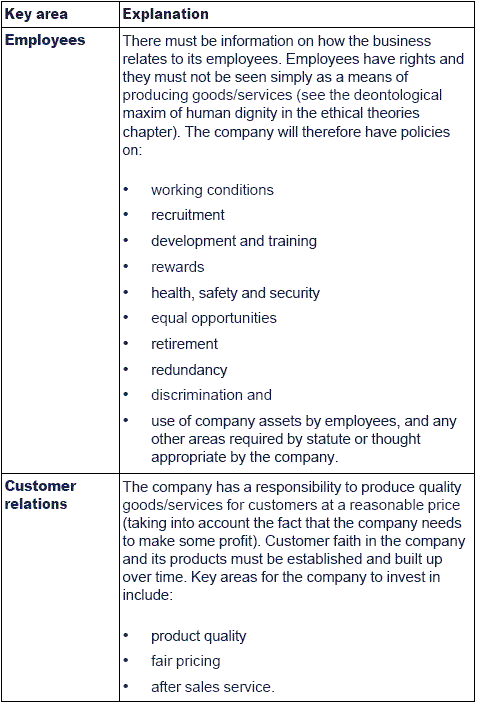
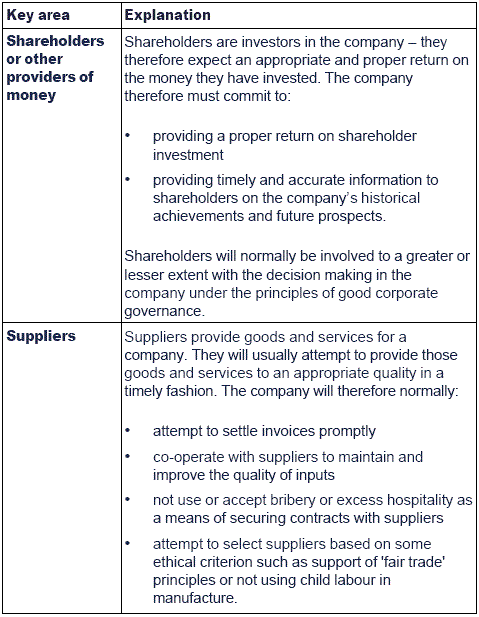
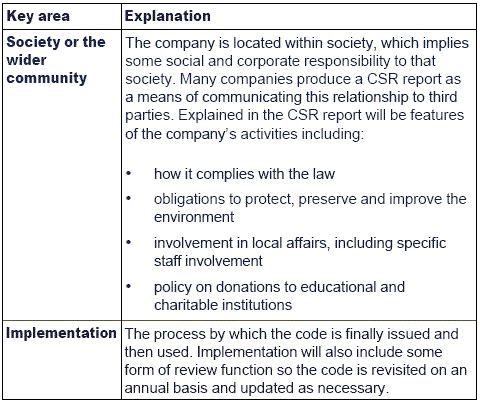
Corporate and professional codes
The presence of a code may assist in resolving an ethical dilemma.
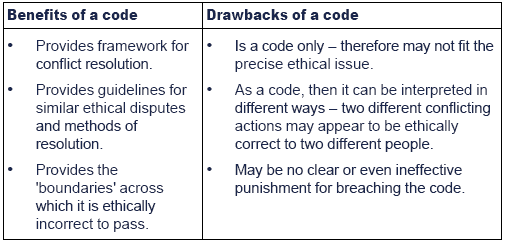
Effectiveness of corporate and professional codes
The effectiveness of the code will be limited due to factors such as:
- the code can be imposed without communication to explain what it is trying to achieved; this will only lead to resentment, particularly amongst employees
- some codes are written, launched and then forgotten as it is now 'in place'. Unless there are reminders that the code is there, then it will not be effective in promoting ethical decision making
- codes that are implemented, and then breached by senior management without apparent penalty are not going to be followed by more junior staff.
To be effective, the code must have:
- participation from all groups as the code is formed (to encourage 'buy in')
- disciplinary actions for breach of the code
- publicity of breaches and actions taken, as this is effective in promoting others to follow the code
- communication and support from top-down to ensure that the code is embedded into company culture.
Professional codes of ethics
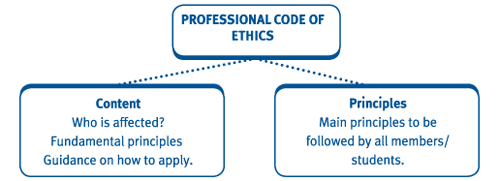
Content
Professional codes of ethics are issued by most professional bodies.
- The main reason for professional codes of ethics is to ensure that members/students observe proper standards of professional conduct.
- Members and students will therefore refrain from misconduct and not make any serious departure from the ethical code.
- If the standards are not observed, then disciplinary action may be taken.
- Maintenance of a professional code of ethics helps the accountancy profession to act in the public interest by providing appropriate regulation of members.
Content of a professional code of ethics
The following are usually included:

Principles
Behind a professional code of ethics, there are underpinning principles, the main ones being:
- Principles apply to all members, whether or not they are in practice.
- The conceptual framework provides guidance on how the principles are applied.
- The framework also helps identify threats to compliance with the principles and then applies safeguards to eliminate or reduce those threats to acceptable levels.
Fundamental ethical principles
Integrity
Integrity implies fair dealing and truthfulness.
Members are also required not to be associated with any form of communication or report where the information is considered to be:
- materially false or to contain misleading statements
- provided recklessly
- incomplete such that the report or communication becomes misleading by this omission.
Objectivity
Accountants need to ensure that their business/professional judgement is not compromised because of bias or conflict of interest.
However, there are many situations where objectivity can be compromised, so a full list cannot be provided. Accountants are warned to always ensure that their objectivity is intact in any business/professional relationship.
Professional competence and due care
There are two main considerations under this heading:
(1) Accountants are required to have the necessary professional knowledge and skill to carry out work for clients.
(2) Accountants must follow applicable technical and professional standards when providing professional services.
Appropriate levels of professional competence must first be attained and then maintained. Maintenance implies keeping up to date with business and professional developments, and in many institutes completion of an annual return confirming that continued professional development (CPD) requirements have been met.
Where provision of a professional service has inherent limitations (e.g. reliance on client information) then the client must be made aware of this.
Confidentiality
The principle of confidentiality implies two key considerations for accountants:
(1) Information obtained in a business relationship is not disclosed outside the firm unless there is a proper and specific authority or unless there is a professional right or duty to disclose.
(2) Confidential information acquired during the provision of professional services is not used to personal advantage.
The need to maintain confidentiality is normally extended to cover the accountants' social environment, information about prospective clients and employers, and where business relationships have terminated. Basically there must always be a reason for disclosure before confidential information is provided to a third party.
The main reasons for disclosure are when it is:
(1) permitted by law and authorised by the client
(2) required by law, e.g. during legal proceedings or disclosing information regarding infringements of law
(3) there is professional duty or right to disclose (when not barred by law), e.g. provision of information to the professional institute or compliance with ethical requirements.
Ethical considerations on disclosure
The accountant needs to consider the extent to which third parties may be adversely affected by any disclosure.
The amount of uncertainty inherent in the situation may affect the extent of disclosure - more uncertainty may mean disclosure is limited or not made at all.
The accountant needs to ensure that disclosure is made to the correct person or persons.
Professional behaviour
Accountants must comply with all relevant laws and regulations.
There is also a test whereby actions suggested by a third party which would bring discredit to the profession should also be avoided.
An accountant is required to treat all people contacted in a professional capacity with courtesy and consideration. Similarly, any marketing activities should not bring the profession into disrepute.
Conflicts of interest and ethical threats
Conflicts of interest and their resolution are explained in the conceptual framework to the code of ethics.
- A framework is needed because it is impossible to define every situation where threats to fundamental principles may occur or the mitigating action required.
- Different assignments may also create different threats and mitigating actions - again it is not possible to detail all the assignments an accountant undertakes.
- The framework helps to identify threats - using the fundamental principles as guidance.
- This approach is preferable to following a set of rules - which may not be applicable. (see later in this chapter).
- Once a material threat has been identified, mitigating activities will be performed to ensure that compliance with fundamental principles is not compromised.
- Where conflicts arise in the application of fundamental principles, the code of ethics provides guidance on how to resolve the conflict.
Conflicts of interest
There are potential threats which may lead to conflicts of interest and lack of independence . These are:
- self-interest
- self-review
- advocacy
- familiarity
- intimidation.
Conflicts of interest and their resolution are discussed in more detail here.
|
Created at 8/15/2012 8:58 AM by System Account
(GMT) Greenwich Mean Time : Dublin, Edinburgh, Lisbon, London
|
Last modified at 9/27/2013 3:50 PM by System Account
(GMT) Greenwich Mean Time : Dublin, Edinburgh, Lisbon, London
|
|
|
|
 |
Rating
:
|
 Ratings & Comments
(Click the stars to rate the page) Ratings & Comments
(Click the stars to rate the page)
|
 |
Tags:
|
|
|
|
|